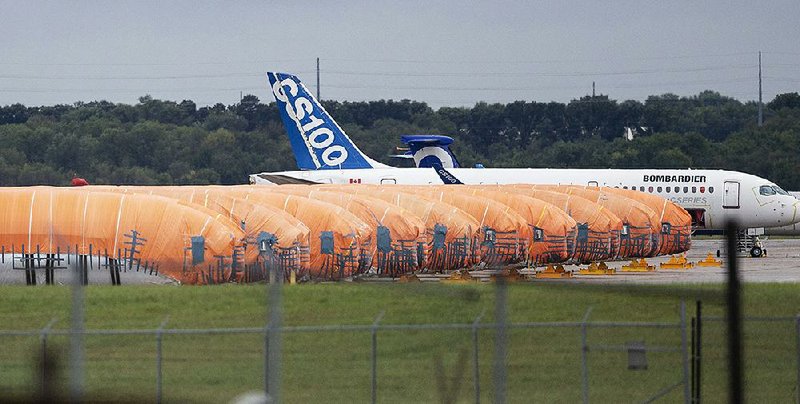WICHITA, Kan. -- Problems for Boeing and its troubled 737 Max aircraft, which appear to be growing deeper, have begun to ripple outward, with a major supplier announcing Friday that it will lay off more than 20% of its workforce in Kansas, where it is based.
The announcement of 2,800 layoffs at a major employer in Wichita, the state's biggest city, came a day after documents became public showing that Boeing employees raised doubts about the safety of the 737 Max, apparently tried to hide problems from federal regulators, and ridiculed those responsible for designing and overseeing the jetliner.
The layoffs threaten to damage a state economy that has been solid for months, with low unemployment and better-than-anticipated state tax collections. Democratic Gov. Laura Kelly and the Republican-controlled Legislature have been able to increase spending on public schools and services, and the layoffs are likely to come up during the state's annual session, which starts Monday.
Spirit AeroSystems is the largest employer in Wichita, which bills itself as the "Air Capital of the World" because of a heavy concentration of aerospace manufacturers. More than 40 aerospace companies, most of them in and around Wichita, provide parts and services for the production of the 737 Max.
The governor's administration had been considering the use of the state's fund for unemployment benefits to pay part of the salaries of Spirit workers so they could remain in their jobs.
Spirit's announcement also came on the same day that the jobs report shows U.S. manufacturers cut payrolls by 12,000 in December, compared with estimates for a gain. Manufacturing companies added 46,000 jobs in all of 2019.
Spirit produced about 70% of the 737 Max, including the fuselage. Contracts with Boeing for the Max represents more than half of Spirit's annual income.
"The difficult decision announced today is a necessary step given the uncertainty related to both the timing for resuming 737 production and the overall production levels that can be expected following the production suspension," Spirit AeroSystems CEO Tom Gentile said in a prepared statement.
Employees will be paid for a 60-day notice period. Affected employees will leave the company beginning Jan. 22.
Just days ago, Spirit broached the subject of voluntary buyouts with employees. The company suspended production of fuselages and other parts for the Max on Jan. 1, after Boeing ordered Spirit to suspend shipments.
Spirit plans to implement smaller workforce reductions this month for its plants in Tulsa and McAlester, Okla.
Cornell Beard, president of the local branch of the International Association of Machinists and Aerospace workers, said the union was meeting with the company to find ways to lessen the impact of the situation as much as possible.
"It's an extremely difficult time for the workers at Spirit AeroSystems who have dedicated their lives to making this company a leader in aerospace. Machinists members and their families in this community have some tough decisions in front of them," Beard said.
The company said that is transferring some 737 Max employees to other programs and setting up job fairs to help laid-off employees.
Dozens of smaller aerospace companies also are beginning to shed jobs.
Sen. Jerry Moran, R-Kan., said he will work with business leaders and Trump administration officials to see that the layoffs have a "short-term impact." He said he has spoken directly with President Donald Trump and Vice President Mike Pence about the layoffs. He said he also spoke this week with the incoming Boeing CEO and the FAA's administrator about doing everything necessary to get the 737 Max back safely in the air.
Key House Democrats on Friday vowed to change how new airplane designs are approved by federal regulators after the release of a trove of damning internal Boeing Co. communications.
"The system is broken, and I am determined that we are going to fix that system," House Transportation Committee Chairman Pete DeFazio, D-Ore., said Friday in Washington.
Boeing employees discussed deep unease with the 737 Max and the simulators used to train pilots on the new jetliner while also mocking senior managers and regulators in messages released by the manufacturer late Thursday.
The internal communications threaten to upend Boeing's efforts to rebuild public trust in the 737 Max, which has been grounded since March after two crashes killed 346 people. That will add to the hurdles for David Calhoun, a longtime board member who will take over on Monday as chief executive officer after Dennis Muilenburg was ousted last month.
"This airplane is designed by clowns, who in turn are supervised by monkeys," said one company pilot in messages to a colleague in 2016. The company provided the documents in December to the FAA and lawmakers, who are investigating the 737 Max and the process that cleared it to fly.
Included in the documents were minutes from a 2013 meeting showing that Boeing employees decided to treat the flight control system linked to the fatal crashes -- known as "MCAS," for maneuvering characteristics augmentation system -- in external communications as an addition to an existing system rather than a new one, while continuing to call the system "MCAS" internally. The minutes noted that treating the software system as a new function may lead to additional training and certification burdens.
DeFazio pointed to another document showing a Boeing employee designated to act on behalf of the FAA approved a Boeing plan to keep references to "MCAS" out of 737 Max materials.
Information for this article was contributed by Roxana Hegeman, John Hanna and Josh Boak of The Associated Press and by Ryan Beene of Bloomberg News.
Business on 01/11/2020
